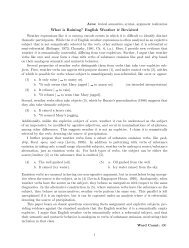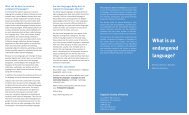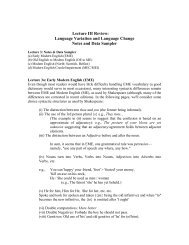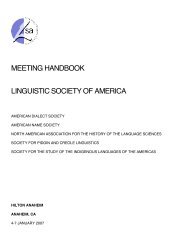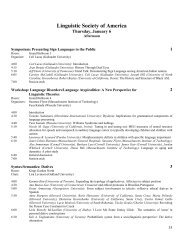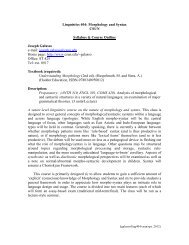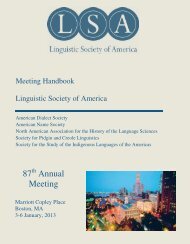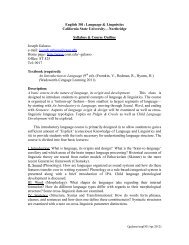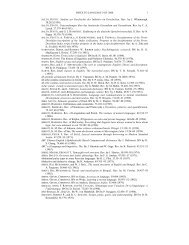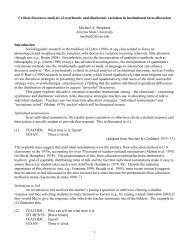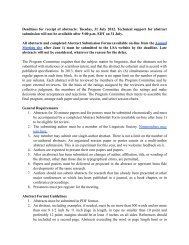here - Linguistic Society of America
here - Linguistic Society of America
here - Linguistic Society of America
You also want an ePaper? Increase the reach of your titles
YUMPU automatically turns print PDFs into web optimized ePapers that Google loves.
Martina Anissa Strommer (University <strong>of</strong> Vienna) Session 80Creating secret pidgin languages as indigenous resistance? A case study from Papua New GuineaOne linguistic consequence <strong>of</strong> German colonialism is Rabaul Creole German (RCG), which is considered the only German-basedcreole language. It originated as the ‘secret’ language <strong>of</strong> mixed-race children in a catholic school in Papua New Guinea after 1897and is de facto extinct today. Drawing on mission sources, the paper reconstructs the linguistic circumstances <strong>of</strong> its developmentand compares them to other settings in which secret pidgins have emerged, such as slavery or prisons. While some argue thatcertain group languages are so-called antilanguages, arising to challenge an established norm, this paper explores whethercreating RCG illustrates anti-colonial struggle.Allyson Stronach (University <strong>of</strong> Nevada, Reno) Session 97Orthographic vowel pairs in Colonial Valley Zapotec willsTlacolula Valley Zapotec is a language with contrastive tone and phonation, and syllable stress. In this paper, I analyze theorthographic representation <strong>of</strong> tone, phonation, and stress in Colonial Valley Zapotec, an ancestor <strong>of</strong> TVZ, by evaluating archivalwills written in Zapotec by native speakers during the Mexican colonial period. As these wills were written using the Romanalphabet, some phonologic features cannot be represented well. This paper presents data on the striking occurrence <strong>of</strong> doublevowels in one will, and the possibility that they may be attempts at representing something about tone, phonation, or stress.Giedrius Subačius (University <strong>of</strong> Illinois at Chicago) Session 75“Experts” <strong>of</strong> Lithuanian Cyrillic script in the Russian Empire (1864-1904)Throughout the 40 years <strong>of</strong> the ban on Latin letters for Lithuanian (1864–1904), the Russian administration in Vilnius and Kaunashad relied on “experts” who were preparing Lithuanian texts in Cyrillic and evaluating the language and orthography. Those“experts” were the source <strong>of</strong> firsthand knowledge <strong>of</strong> Lithuanian for an administration that was unable to comprehend thelanguage. During the years <strong>of</strong> the ban, five major “experts” <strong>of</strong> Lithuanian were employed: Mikuckis, Krečinskis, Kashirin,Liatskii, and Poidėnas. But many <strong>of</strong> them were lacking competence, which significantly contributed to the empire’s failure toattract Lithuanians to the Cyrillic script.John Ryan Sullivant (University <strong>of</strong> Texas at Austin) Session 97The tones <strong>of</strong> Tataltepec ChatinoMeghan Sumner (Stanford University) Session 7Reiko Kataoka (San Jose State University/Stanford University)I heard you but didn’t listen: listeners encode words differently depending on a speaker’s accentAccent variation can be costly to spoken word recognition as exemplified by reduced semantic priming <strong>of</strong> out-<strong>of</strong>-accent speechfor the speakers <strong>of</strong> General <strong>America</strong>n English (GA). In this study, we tease apart two possible explanations <strong>of</strong> this cost: (1)Differences in the initial encoding <strong>of</strong> the words; or (2) Differences in lexical activation and subsequent semantic spreadthroughout the lexicon. Using the false memory paradigm, we find greater false memory effects for NYC-accented speech thanfor RP- and GA-accented speech, suggesting that semantic spread is unimpaired. We argue that listeners encode wordsdifferently depending on a speaker’s accent.Sandhya Sundaresan (University <strong>of</strong> Tromsø/University <strong>of</strong> Stuttgart) Session 17Syntacticizing perspective: the formal anatomy <strong>of</strong> Tamil kolThe clause-internal binding <strong>of</strong> the Tamil anaphor ta(a)n typically requires the suffixation <strong>of</strong> a morpheme kol to the predicate. kolalso marks unaccusatives, motivating its analysis as a predicate-detransitivizer (Lidz, 2004), similar to Greek “non-active”morphology (Embick, 2004). Based on new evidence involving kol-suffixation on non-reflexive transitives and underlyingintransitives, I show that it doesn't affect predicate-valency. Rather, I propose that kol realizes a Point-<strong>of</strong>-View head thatcontributes a mental/spatial perspective to the highest argument, which then allows it to antecede ta(a)n. I show, by extension,that many anaphors crosslinguistically are just “perspective-seekers” and develop a formal syntactico-semantics for perspective.Daniel Suslak (Indiana University) Session 101The Mayanization <strong>of</strong> Ayapanec Gulf ZoqueanAyapanec Gulf Zoquean has been significantly reshaped via contact with Chontal, coming to resemble in many respects a Mixe-Zoquean language with Mayan syntax. In this paper we identify and examine Mayan features in Ayapanec, with emphasis on207



